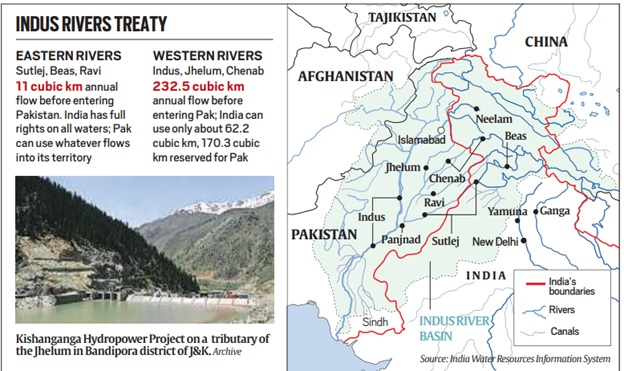India Halts Indus Water Treaty Negotiations with Pakistan
Why in the news?
India suspends meetings of the Permanent Indus Commission, citing unresolved treaty renegotiation issues and a lack of satisfactory responses from Pakistan.
Freeze on Discussions:
- India will halt meetings of the Permanent Indus Commission (PIC) until both countries discuss revising the 64-year-old Indus Water Treaty.
- The last PIC meeting was held in Delhi in May 2022.
- Since January 2023, India has requested four times for talks on revising the treaty but has not received a satisfactory response from Pakistan.
Indus Water Treaty Context:
- Signed in 1960, the treaty governs the sharing of six Himalayan rivers between India and Pakistan.
- The PIC, a key component of the treaty, typically meets annually to address issues related to water sharing and hydel projects.
- Despite conflicts and occasional disruptions, the PIC has been a consistent fixture until now.
India’s Concerns and Actions:
- On August 30, 2024, India sent its fourth letter since 2023 requesting treaty renegotiation.
- Key concerns include changes in population demographics, environmental issues, and cross-border terrorism.
- India emphasises resolving the dispute resolution mechanism as a priority.
About Indus Waters Treaty:
- Signed: 1960 by India’s Prime Minister Jawaharlal Nehru and Pakistan’s President Ayub Khan.
- Purpose: Mechanism for cooperation over the Indus System of Rivers.
Salient Provisions:
- Water Allocation:
- Western Rivers (Indus, Jhelum, Chenab) to
- Eastern Rivers (Sutlej, Ravi, Beas) to
- India can use Western Rivers for domestic, non-consumptive, agricultural, and hydro-electric purposes.
- Permanent Indus Commission: Established for information exchange, cooperation, and conflict resolution.
- Storage Rights: India can store up to 75 MAF of water on Western Rivers.
- Exit Provision: Treaty remains in force unless both countries agree to a new pact.
Dispute Resolution Mechanism:
- Step 1: Questions resolved at the Permanent Commission or inter-government level.
- Step 2: Differences referred to a Neutral Expert appointed by the World Bank.
- Step 3: Disputes can be taken to a Court of Arbitration.
Pakistan’s Reservations:
- Kishenganga Hydro Electricity Project: Concerns over dam height affecting water storage
- Rattle Hydroelectric Power Project: Fears of artificial water shortage or flooding.
Associated Article:
https://universalinstitutions.com/inspection-of-power-projects-under-indus-water-treaty/




